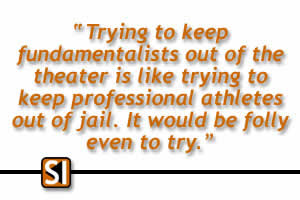Fundamentalists and Theater: Act Five, Curtain Call
Act 1 l Act 2 l Act 3 l Act 4 Our most important duty is to love the Lord our God with all our heart, soul, mind, and strength. Our second most important duty is to love our neighbors as ourselves. Love of God, love of neighbor: the center of the Christian life is a matter of emotion, or, more properly, of affection.
Our most important duty is to love the Lord our God with all our heart, soul, mind, and strength. Our second most important duty is to love our neighbors as ourselves. Love of God, love of neighbor: the center of the Christian life is a matter of emotion, or, more properly, of affection.
Therefore, anything that shapes the affections must be of primary concern for the believer. We can love much, or we can love little. We can love well, or we can love poorly. We can love rightly, or we can love wrongly. We can love the things we ought or the things we ought not. We can love from the right motives or from the wrong ones. Our affections can be ordinate, or they can be inordinate.
To object to inordinate love is not to object to love. To point out disordered emotions is not to denigrate emotions. In fact, those who care most about emotion are likely to be most concerned that emotions be of the proper kind, to the proper degree, and directed toward the proper object.
All of the arts shape our habits of mind and heart. They open and close doors of perception and feeling. That is why we need to take them seriously. We must decide which art we shall allow to access our souls. To choose wisely, we must understand what we are choosing.
This principle is true of the arts in general, and it is true of theater in particular. Perhaps it is true that previous generations of Christians were guilty of a too-facile denunciation of theater. Perhaps it is true that the present generation is guilty of a too-naïve acceptance. Perhaps both are true at the same time. The only way we shall know is when we have discovered what kind of thing we are dealing with.
Perhaps you have noticed that this series of essays has offered no direct argument either for or against theater. Of course, I have a bias, and I doubt that any careful reader can fail to have noticed it. Still, the point of the essays has not been to argue the merits of theater one way or the other. The purpose of the essays is to get us to the point at which we can begin a meaningful discussion.
In attempting to prepare the way for that discussion, I have tried to take four steps. The first essay attempted to outline the history of our recent and significant shift in attitude toward the theater. The second summarized my own background in the theatrical arts so readers might understand how existential this issue can become and how personal it is for me. The third essay urged that we must understand how theater works, paying close attention both to our own experiences of theater and to the long conversation about the nature of theatrical communication. The last essay added that seeking to understand the prohibition of theater throughout the Christian past is the best way of compensating for our own myopic situation.
These I take to be the prerequisites for any useful discussion. Of course, it is also possible to have a second-order discussion about the prerequisites themselves. One thing is certain, however. No bald assertion that “the principles of Scripture do not apply to theater per se” is likely to go anywhere. That assertion is precisely what the discussion needs to be about. C. S. Lewis offered a useful observation in The Abolition of Man, his extended treatise on “how education develops man’s sense of morality.” He stated that we cannot justify or explain moral sensibility in the abstract but only from within the practice of morality itself. It is no use to deliver a lecture on restraint to a couple of teenagers in the backseat of a parked car—they are otherwise engaged. We cannot convince a meth user that sobriety is really better, at least not until he has been off the drug for a while. Moral sensibility often seems nonsensical and restrictive when viewed from outside, especially to those whose appetites have been captured by contrary influences. Very few if any circumstances exist under which morality can be discussed abstractly and objectively: we are simply too engaged to begin with.
C. S. Lewis offered a useful observation in The Abolition of Man, his extended treatise on “how education develops man’s sense of morality.” He stated that we cannot justify or explain moral sensibility in the abstract but only from within the practice of morality itself. It is no use to deliver a lecture on restraint to a couple of teenagers in the backseat of a parked car—they are otherwise engaged. We cannot convince a meth user that sobriety is really better, at least not until he has been off the drug for a while. Moral sensibility often seems nonsensical and restrictive when viewed from outside, especially to those whose appetites have been captured by contrary influences. Very few if any circumstances exist under which morality can be discussed abstractly and objectively: we are simply too engaged to begin with.
To the extent that theater is a moral phenomenon and to the extent that it appeals to the appetites, I suspect that our ability to evaluate it is similarly limited. At any rate, I have noticed this in myself: the more I expose myself to theater (whether stage or screen), the more of it I want and the less thoughtful and discerning I become in what I want. I can easily allow myself to be captivated by stuff that I know is wrong. If someone challenges me, I find that I respond viscerally rather than rationally. If my wife snaps off the TV, I am instantly irritated because I want to see that ungodly stuff. If I continue exposing myself to profane perspectives and depictions, they quickly carry over into the real world, and I find myself no longer shocked at sin.
Sounds depraved, doesn’t it? In fact, it is. My depravity takes only a bit of stirring up, and it is ready to go. The point is, however, that I don’t begin by seeking out theater that will give me wisecracking attitudes, foul language, inhumane violence, or risqué double entendres. I start out looking for a bit of amusement. I want a diversion, and I begin with something that looks innocent. Once that choice is made, however, the slide begins. How far it would carry me eventually, I don’t know. And I hope I never find out. That’s one reason why I have chosen to distance myself from the medium.
Maybe I am the only one whose depravity works this way. Perhaps what I’m admitting is so unusual that others are never bothered by it. They may even find it bizarre. I have noticed, however, that when the topic of theater comes up, contemporary Christians tend to react just the way that I do when my wife snaps off the television. Merely to raise the issue is to ask for abuse.
One need not be a prophet to know that American Christianity—including Fundamentalism—will not be diverted from its fascination with stage and screen. Trying to keep fundamentalists out of the theater is like trying to keep professional athletes out of jail. It would be folly even to try.
Since I expect no one to adopt my eccentric views, I have not attempted to argue for them or even to present them. What I have tried to argue is that there is something worth discussing, and if we are going to discuss it, we are going to have to prepare ourselves. Before we can say anything useful or even meaningful on this topic, we must grasp certain categories and familiarize ourselves with certain perspectives. My wish is that we might come to a point at which we could have a sober conversation about the merits of theater. It is clear that we cannot now.
Being serious about culture does not mean surrounding oneself with cultural artifacts. Attending symphonies, producing plays, and hanging paintings on the wall do not make one serious about culture. We cannot say we are sober until we have (at minimum) developed the capacity to judge critically what is good and what is bad. That we learn such judgment is vital, for the only Fundamentalism worth saving is a Fundamentalism that is serious about culture.
The Pain of Love
Frederick William Faber (1814-1863)
Jesus! why dost Thou love me so?
What hast Thou seen in me
To make my happiness so great,
So dear a joy to Thee?
Wert Thou not God, I then might think
Thou hadst no eye to read
The badness of that selfish heart,
For which Thine own did bleed.
But Thou art God, and knowest all;
Dear Lord! Thou knowest me;
And yet Thy knowledge hinders not
Thy love’s sweet liberty.
Ah, how Thy grace hath wooed my soul
With persevering wiles!
Now give me tears to weep; for tears
Are deeper joy than smiles.
Each proof renewed of Thy great love
Humbles me more and more,
And brings to light forgotten sins,
And lays them at my door.
The more I love Thee, Lord! the more
I hate my own cold heart;
The more Thou woundest me with love,
The more I feel the smart.
What shall I do, then, dearest Lord!
Say, shall I fly from Thee,
And hide my poor unloving self
Where Thou canst never see?
Or shall I pray that Thy dear love
To me might not be given?
Ah, no? love must be pain on earth,
If it be bliss in heaven.
 –––––-This essay is by Kevin T. Bauder, president of Central Baptist Theological Seminary. Not every one of the professors, students, or alumni of Central Seminary necessarily agrees with every opinion that it expresses.
–––––-This essay is by Kevin T. Bauder, president of Central Baptist Theological Seminary. Not every one of the professors, students, or alumni of Central Seminary necessarily agrees with every opinion that it expresses.- 1 view

Discussion